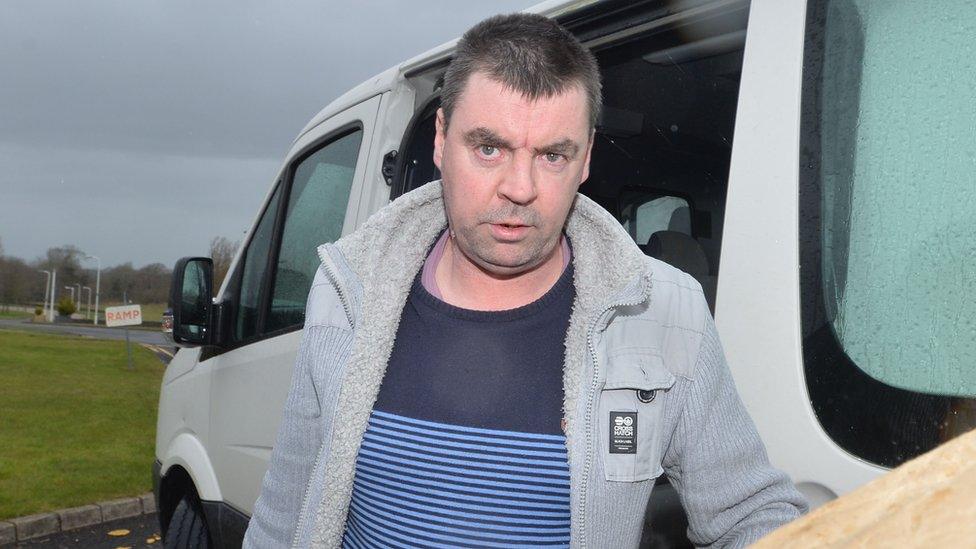Timeline of Omagh bomb families' search for justice
- Published
BBC News NI looks at the events of 15 August 1998, the day of the Omagh bombing
The Omagh bomb exploded on 15 August 1998, killing 29 people including a woman pregnant with twins.
No-one has ever been convicted of the atrocity.
BBC News looks back at the many legal twists and turns in the families' two-decades campaign for justice.
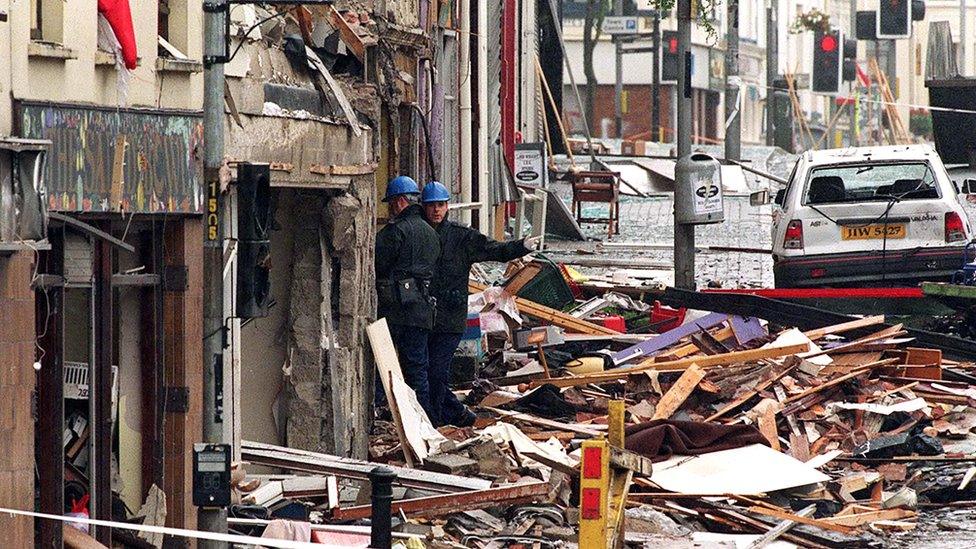
The bomb detonated in a car parked in the middle of the main street in the town
15 August 1998
A large car bomb explodes on a Saturday afternoon in the centre of Omagh,, external County Tyrone. The town's main street is crowded with shoppers and more than 200 people are injured.
Twenty-nine of the victims, including a woman pregnant with twins, will die as a result of their injuries. In terms of the final death toll, it is the worst single atrocity after almost 30 years of the Troubles in Northern Ireland.
18 August 1998
A recently-formed dissident republican group, calling itself the Real IRA, claims responsibility for the bomb, external. In a statement, the paramilitary group says its targets were "commercial" and offers an apology to the "civilian" victims.
12 December 2001
The judgement and leadership of the head of the police in Northern Ireland during the Omagh bomb investigation is described as "seriously flawed", external. The comments come in a damning report by Police Ombudsman Nuala O'Loan, external.
Chief Constable Sir Ronnie Flanagan says the report does not represent a "fair, thorough or rigorous investigation". He says both he and the force are considering legal action to quash the report, external.
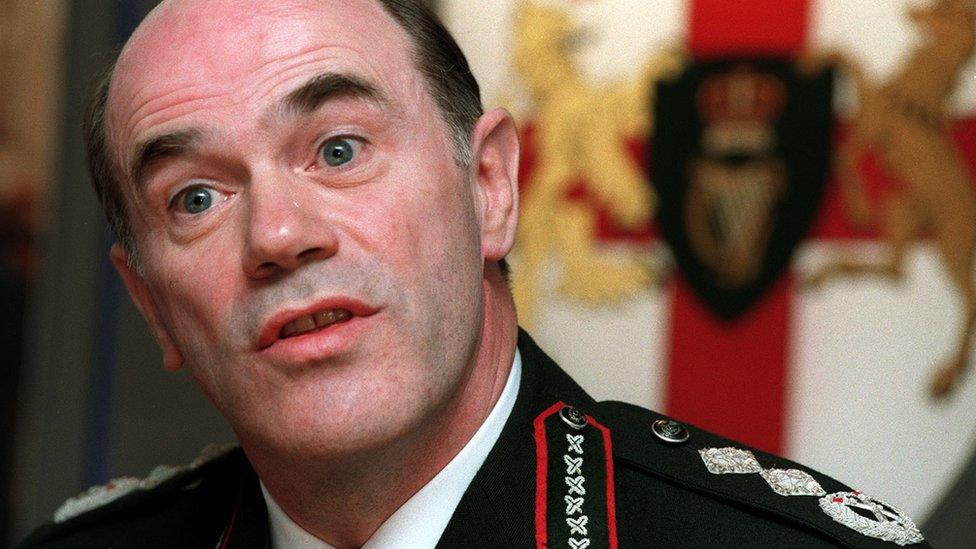
Sir Ronnie Flanagan was the head of the police at the time of the bombing in 1998
22 January 2002
A dissident republican is found guilty of plotting to cause the Omagh bombing, external.
Colm Murphy, then 49, is the only person charged in connection with the bombing. Murphy, a builder and publican originally from south Armagh, had denied one charge of conspiring to cause an explosion but three judges at a non-jury court in Dublin deliver a guilty verdict.
24 January 2002
The Police Service of Northern Ireland rejects a number of key allegations made in the ombudsman's report. Sir Ronnie Flanagan accepts that some mistakes were made but insists that nothing could have been done to prevent the bombing., external
6 August 2003
The alleged founder and leader of the Real IRA, Michael McKevitt, is found guilty of directing terrorism, external and membership of an illegal organisation in the Republic of Ireland.
The businessman, from Blackrock in County Louth, is not charged over the bomb but is the first person to be prosecuted for directing terrorism. The Irish government introduced the new offence in response to the Omagh attack.
21 January 2005
Colm Murphy's conviction is ruled unsafe due to alleged irregularities surrounding evidence, external given by detectives at his trial. He faces a re-trial.
Who were the victims of the Omagh bombing?
26 May 2005
County Armagh man Sean Hoey is formally charged in court with the murders of 29 people, external in the 1998 Omagh bombing. The electrician, from Molly Road in Jonesborough, is the first person to face a murder charge in relation to the attack.
20 December 2007
Sean Hoey is found not guilty of 58 charges, external, including the murders of 29 people in the Omagh bombing. Clearing Mr Hoey, the judge criticises police witnesses for "deliberate and calculated deception" during the 10-month trial.
23 January 2008
Sir Ronnie Flanagan, the head of the police at the time of the Omagh attack, apologises to the families of the victims of the bomb, external. He says he is "desperately sorry" people have not yet been brought to justice.
7 April 2008
The victims' families begin a landmark civil case, suing five men they allege were involved, external. The case breaks new legal ground, and is believed to be the first time anywhere in the world that alleged members of a terrorist organisation have been sued.
8 June 2009
The judge in the civil trial rules that Michael McKevitt, Liam Campbell, Colm Murphy and Seamus Daly were all liable for the Omagh bomb, external. He orders them to pay a total of £1.6m in damages to 12 relatives who took the case. A fifth man, Seamus McKenna, is cleared of liability.
24 February 2010
Colm Murphy, the only man jailed in connection with the bombing, is cleared following a retrial, external. The judge says interview evidence from members of An Garda Síochána (Irish police force) is inadmissible.
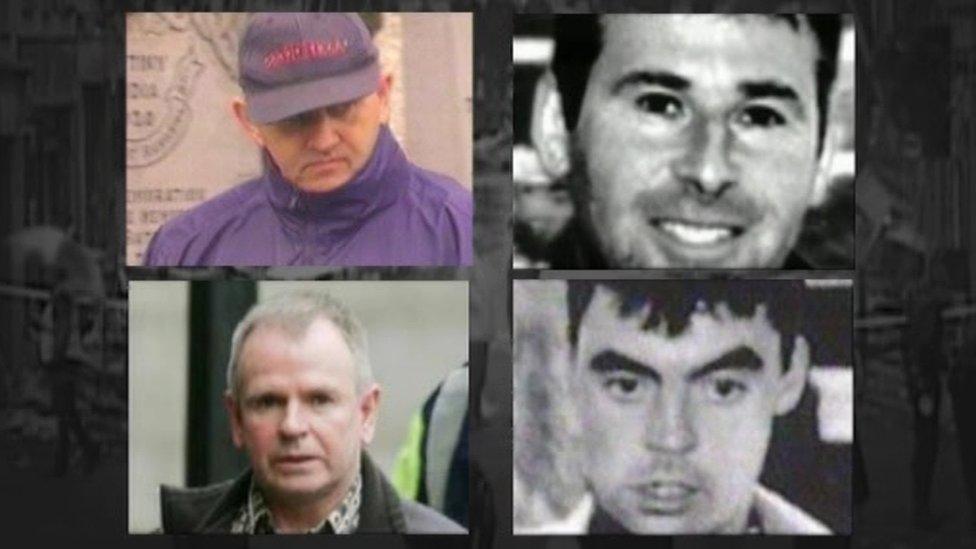
In 2009, Michael McKevitt, Liam Campbell, Colm Murphy and Seamus Daly were found responsible for the bombing in a landmark civil trial
7 July 2011
Michael McKevitt and Liam Campbell lose their appeal against the civil trial verdict. Colm Murphy and Seamus Daly both win their appeals but will face a civil retrial.
20 March 2013
Seamus Daly and Colm Murphy are both found liable for the Omagh bombing after a civil retrial.
12 September 2013
Northern Ireland Secretary Theresa Villiers says she has decided not to hold a public inquiry into the circumstances surrounding the Omagh bombing, adding that she does not believe there are sufficient grounds to justify a further inquiry beyond those that have already taken place.
14 July 2013
Seamus McKenna, who was acquitted in the civil action taken by relatives of the bomb victims, dies age 58. His death is a result of injuries he sustained in a fall while repairing a roof at a school in Dundalk, County Louth. A major security operation is put in place for his funeral four days later.
10 April 2014
Police in Northern Ireland charge Seamus Daly with the murders of 29 people in the Omagh bomb attack. They also charge him with an attempted bomb attack in Lisburn, County Antrim, that took place in 1998.
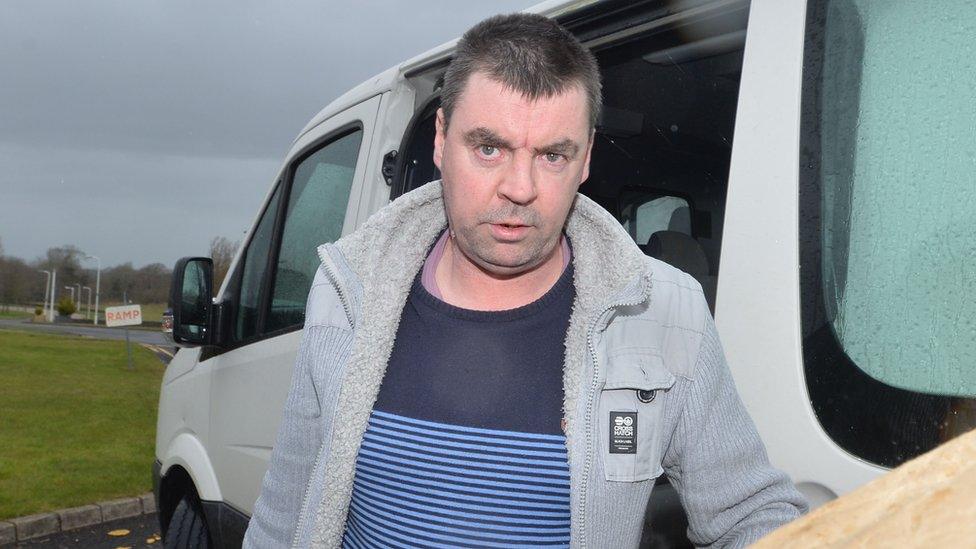
Seamus Daly was released from Maghaberry Prison in County Antrim
1 March 2016
The prosecution case against Seamus Daly collapses. The Public Prosecution Service decides there is no reasonable prospect of conviction after a key witness contradicted his own previous testimony. Mr Daly, who has always denied any involvement in the bombing, is released from prison.
29 September 2016
A bid by two men to overturn a landmark civil ruling that found them liable for the Omagh bombing is rejected by the European Court of Human Rights. Liam Campbell and Real IRA leader Michael McKevitt took their case to Europe, arguing that the civil trial in Belfast High Court had been unfair.
20 December 2016
Belfast's High Court allows some evidence connected to the 1998 Omagh bombing to be heard in secret. The government had applied for a "closed material procedure" (CMP) for a judge to examine whether public disclosure of information would be damaging to national security. After viewing a sample of sensitive documents, the judge ruled that a CMP would be allowed.
10 August 2017
It emerges that relatives of the Omagh bomb victims are to sue Northern Ireland's police chief for failings they believe allowed the killers escape justice. A writ is issued against the chief constable, focusing on what happened after the car bomb and why no-one has been convicted of murder.
The BBC's Ireland correspondent Chris Page reports from a ceremony marking the 20th anniversary of the Omagh bombing
12 and 15 August 2018
Events including a cross-community memorial ceremony are held to mark the 20th anniversary of the Omagh bomb. As well as prayers, speeches and music, a minute's silence is held in remembrance of those who died. A bell is rung 32 times in memory of the victims, with the extra single peal for all who have lost their lives in atrocities around the world.
9 July 2020
A Fermanagh and Omagh District Council committee passes a motion opposing the extradition of Liam Campbell to Lithuania over allegations he was part of an operation to buy guns and bombs for the Real IRA.
Put forward by an independent councillor, the motion is supported by Sinn Féin and the SDLP. Shortly afterwards SDLP leader Colum Eastwood says it is wrong and his party subsequently withdraws its backing.
2 January 2021
Michael McKevitt dies, having been diagnosed with cancer. The 71-year-old had been released from prison in 2016 after his conviction in 2003 for directing terrorism.
4 March 2021
Northern Ireland First Minister Arlene Foster says the relatives of those murdered in the bombing deserve an apology over the length of time a court is taking to rule on a call for a public inquiry. The lord chief justice's office blames the situation on the assessment of "sensitive" documents.
23 July 2021
Belfast High Court rules it was plausible that the bomb could have been prevented by security services and Mr Justice Mark Horner calls for new investigations in the UK and the Republic of Ireland. Michael Gallagher, who brought the legal action, calls again for a full public inquiry.
8 October 2021
Explaining its reasons for urging new investigations, the High Court in Belfast says it had heard that in the six months before August 1998 there had been 24 dissident attacks - many of the suspects would later be involved in the Omagh bomb.
Mr Justice Horner said: "There is no doubt the authorities could have made life very uncomfortable for those dissident republicans.
"It is arguable that such a proactive policy would have had the real prospect of preventing the Omagh bomb."
The Northern Ireland Office says it will "carefully consider" calls for a fresh investigation.
15 November 2022
The Northern Ireland Secretary Chris Heaton-Harris meets some of the families of those killed and asks for more time to consider if there should be an investigation or public inquiry.
28 November 2022
A decision on whether to order a new investigation or public inquiry into the Omagh bombing is expected to be made in January, the High Court in Belfast hears.
2 February 2023
The UK government announces there will be an independent statutory inquiry into the Omagh bombing.
It will have the full powers of the Inquiries Act 2005, the act under which public inquiries are normally held. It was described by Michael Gallagher as an "important step forward".
"It's going to be a difficult process"
12 June 2023
Lord Turnbull, a senior judge in Scotland, is appointed as the chairman of the inquiry.
28 June 2023
The Irish government said it would consider its next steps when it has more clarity on the UK's inquiry.
Tánaiste (deputy prime minister) Micheál Martin said his government needed to see the terms of reference. "As we approach the 25th anniversary of the attack, we will not be found wanting," he added.
13 August 2023
Relatives and friends of those who died in the Omagh bomb remember their loved ones at a special service to mark the 25th anniversary of the atrocity.
15 August 2023
A moment of silence for families and victims of the bomb is held in Omagh on the 25th anniversary. Prayers are said at the glass obelisk marking the scene of the bomb on Market Street.
18 August 2023
The Irish government is labelled "disrespectful" for ignoring a judge's call for a public inquiry into the Omagh bomb on both sides of the border.
Solicitor John McBurney, who represents some families bereaved by the atrocity, calls for Dublin to reconsider after a minister indicated there was no new evidence to merit a public inquiry in the Republic.
21 February 2024
The terms of reference for the inquiry, external into the bomb are published.
The inquiry will examine four key issues surrounding whether the attack could have been prevented.
22 February 2024
Former police ombudsman Baroness Nuala O'Loan says a separate inquiry by the government in the Republic of Ireland into the Omagh bombing would be "most useful".
30 July 2024
At a preliminary hearing, Chairman Lord Turnbull promises that the inquiry will undertake its task "rigorously and fearlessly".
In his first remarks, Lord Turnbull says the trauma caused by the bombing "has been enduring and continues to have a most powerful impact".
After the names of those murdered are read out by an inquiry lawyer, a minute's silence is held.
28 January 2025
The initial stage of the Omagh Bomb Inquiry begins at Strule Arts Centre.
The first day of the commemorative hearings is remembering two victims from Madrid, Spain.
Twelve-year-old Fernando Blasco Baselga and 23-year-old Rocio Abad Ramos were in NI as part of a language exchange group at the time of the atrocity.
Commemorative hearings are set to last for two weeks, followed by a week of statements by survivors of the atrocity, then a week of stories from emergency service members who dealt with its aftermath.
- Published28 January
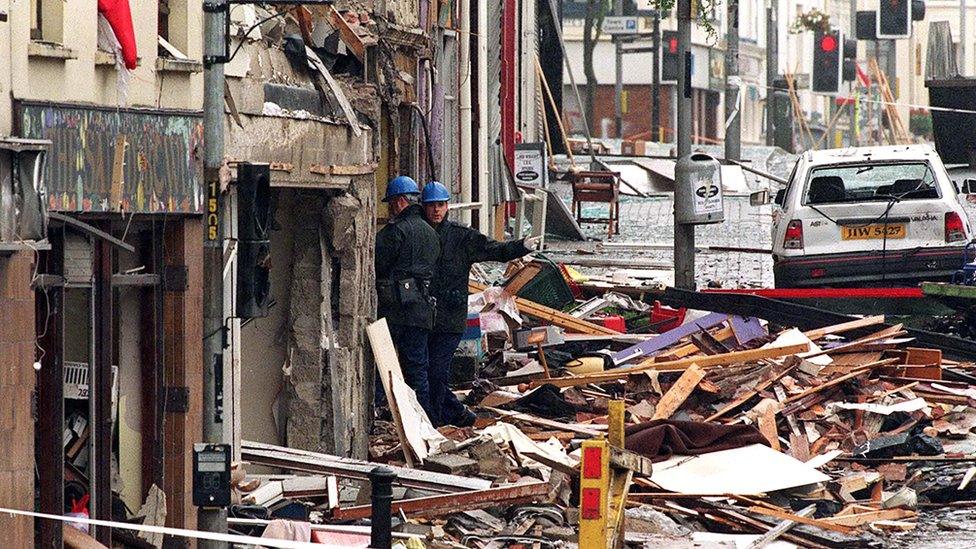
- Published1 March 2016
